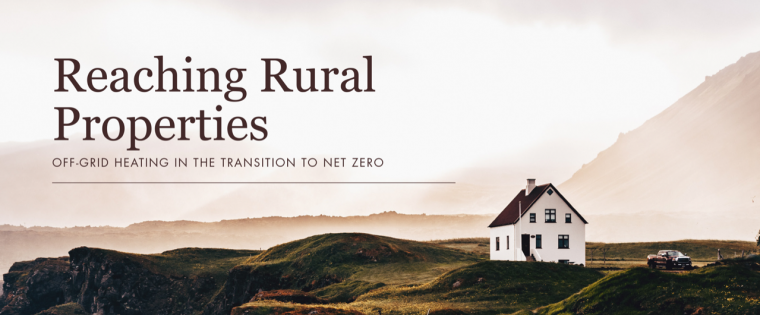Reaching rural properties
Off-grid heating in the transition to Net Zero
Author: Zayn Qureshi |

The UK’s housing stock represents one of the most significant challenges to overcome in achieving net zero emissions by 2050. While measures around new buildings will be important, decarbonising nation’s existing housing stock is a priority for net zero policy, given that 80% of the houses people will be living in by 2050 have already been built today. The task of decarbonising off-grid homes – around four million households across the UK – warrants particular consideration.
Download the executive summary.
Key points
Off-grid energy in the UK
Geography is the principal reason why many domestic and commercial properties will be off the gas grid, with a higher percentage of households in rural areas generally off the grid than in urban areas. In the current political and economic context, these homes and businesses face a myriad of unique place, property and personal challenges that need to be addressed in order to bring all households along on the journey of heat decarbonisation. On the one hand, there are factors which exacerbate the cost-of-living issue for those living off-grid whilst on the other, challenges around decarbonisation are currently not well reflected in policy.
The costs of living off the gas grid will depend on the fuel source. While low carbon options are cheaper in the long run, they have high up-front costs that many rural households are unable to afford. Many off-grid properties are not uniform in design and idiosyncratic in character. They are often a lot older and tend to be poorly insulated. These issues are exacerbated in the current cost-of-living crisis and the associated rise in energy prices. The funding and incentive support currently available, including the Boiler Upgrade Scheme, will contribute to the transition to low carbon heating and the uptake of heat pumps – however there remain major barriers for those properties that are currently unsuitable for heat pump installation.
The current policy landscape
In October 2021, the government launched the Heat and Buildings Strategy to outline the transition to net zero heating. Of particular relevance for some off-grid households, the strategy sets a ‘clear ambition for industry to reduce the cost of installing a heat pump by 50 percent by 2025 and to ensure heat pumps are no more expensive to buy and run than gas boilers by 2030’. Alongside the strategy, government also put out a new call for evidence ‘Phasing Out the Installation of Fossil Fuel Heating in Homes Off the Gas Grid’ – the results of this consultation are of great importance to many rural off-grid households. As it stands, placed against the unique challenges facing those off the grid, the proposed approach risks failing to adequately help households decarbonise.
In the long term, what off-grid homes need is tailored support around fabric first energy efficiency measures including loft insulation, bringing down bills and paving the way for low-carbon heating systems. It is important for government to show consistency in its approach to decarbonising heat in off-grid properties. Policy support for off-grid properties needs to set out long-term certainty to allow those households ready for low carbon heating systems to transition at pace. When it comes to the proposed regulations, concern has been expressed over rural communities not being adequately communicated to or engaged with – meaning they risk not understanding either what they are or what their implications could be.
Alternatives to the current approach
While an eventual transition to heat pumps is the desired outcome, the current all-or-nothing approach of the government, through the 2026 end date for the installation of fossil fuel heating as well as the ‘heat pump first’ approach, places an unfair and disproportionate burden on off-grid properties. The government has recognised the potential benefits of net zero consistent biofuels has acknowledged the potential of bioLPG as part of a hybrid heating system along with an air source heat pump. A mixed technology approach, where low carbon technologies along with feasible ‘drop in’ fuels such as bioLPG, play equal parts in reaching the net zero goals in a cost-effective and popular manner should be adopted. Overall, this would allow more choice for off-grid consumers, which would increase the likelihood of meeting net zero transition targets.
Many rural tenants are older and face different living circumstances to their urban counterparts. Therefore, a mixed technology and flexible approach has the added benefit of adapting to the needs of households, whilst also embedding an understanding of the need to decarbonise heating and its wider significance. Through creating a range of choices, a market incentive is provided for suppliers to start producing more low carbon fuels and to bring them to market. Additionally, it instils a sense of individual agency for meeting the varied needs of unique properties, as opposed to imposing limited ‘one size fits all’ solutions in what might be felt as a high-handed, top-down manner.
Recommendations
The table below displays key facets of the current approach to decarbonisation of off-grid homes, alongside policy recommendations based on the research for this report that might make net zero more achievable for the four million homes currently using off-grid heating.
| Government policy | Localis recommendation |
| An end to the installation of fossil fuel heating in homes off the gas grid from 2026.
– Part of this policy will rely on working with industry to reduce upfront cost of heat pump installation by 50% by 2025 and achieve cost parity between them and gas boilers by 2030. – Government support to enable an end to installation of fossil fuel heating includes £450 Boiler Upgrade Scheme and £2.5bn Heat Upgrade Grant – Government believes these steps will enable them to end the installation of fossil fuel heating in off-grid homes from 2026. They believe this is enough time to allow their funding support and the market mechanism time to improve heat pump market condition
|
Bring the 2026 ban on fossil fuel boilers for off-grid homes into line with the 2035 deadline for on-grid homes.
– Set out evidence for how government will work with industry to reduce costs of installation and what steps are being taken already. – Increase the amount available within the Boiler Upgrade Scheme to match the entire cost of a heat pump. – Broaden the Boiler Upgrade Scheme to include liquid bio-fuels. – Four years is not enough time to improve the current heat pump market condition. Government needs to improve the incentive schemes available to households as well as embark on a communication campaign to engage with off-grid households over the proposed regulations. This will help increase uptake and help grow the market. |
| A ‘heat pump first’ approach to replacement heating systems from 2026.
– This entails setting a high standard governing the choice of replacement heating system, with air source heat pumps being the lead replacement technology in most cases. – Ahead of the regulation coming into force, government will issue guidance on how households and installers should determine whether it is reasonably practicable to install a heat pump in their home. – Government also proposes to extend this ‘heat pump first’ approach to replacement heating systems in off-grid fossil fuel heated homes that can be made suitable through minor energy efficiency upgrades that can be done quickly including insulation. |
Government should not be proscriptive over technology at this stage in the decarbonisation process.
– With an eventual transition to heat pumps in mind, at this stage government must encourage a variety of low carbon heating technologies that accord with the place circumstances of each rural off-grid community. – Government must work with industry to immediately set out guidance on the different low carbon options available for households that are not ready for heat pump installation. – With focus currently on costly major transformations to homes and their heating systems, more achievable improvements to efficiency risk being overlooked. The government should provide funding for ‘fabric first’ improvements to rural homes via local councils. |
| Requiring high performing replacement heating systems where heat pumps cannot reasonably practicably be installed
– Government intends to consult on the criteria governing the choice of replacement heating systems available to households not ready for heat pumps ahead of the 2026 implementation of the heat pump first approach. – Government have proposed that any alternate choice of technology for households not ready for heat pumps must reflect the high standards of performance of high temperature heat pumps and solid biomass systems. – It is believed that this proposal will create space for industry to innovate and bring forward new low carbon heating solutions that are not currently available. |
Embed a mixed technology approach in the regulatory framework and work with industry stakeholders to determine what role biofuels will play in the decarbonisation of off grid homes.
– Government needs to work with industry stakeholders operating in alternative low carbon heating sectors to set out the role and capacity of each replacement heating system. This communication needs to be underpinned by clarity and consistency. – Work with same industry stakeholders to clarify what ‘high standards of performance’ means and how alternative low carbon heating technologies can achieve this. – Providing certainty over the role that biofuels will play in the decarbonisation of off-grid homes will allow the sector to make the appropriate investment decisions to build required infrastructure and stimulate the market. – Government must ensure that the mixed technology approach in the regulatory framework is localised and flexible depending on the place circumstances of off grid homes. |
In addition to this:
- The electricity infrastructure in rural areas is in many places not prepared for a widespread switch to electricity as a primary heating source. Therefore, it is important that government build a programme of electricity infrastructure upgrade in rural areas into the roadmap to net zero.
- The current Energy Performance Certificate methodology is not well-suited to application in off-grid homes. The government should review the EPC methodology with the aim of redressing the unequal impact on off-grid homes.
At a local level:
- Regional Heat Decarbonisation Hubs should be developed that bring together local state stakeholders including energy providers, neighbouring local authorities and installers. These should be collaborative efforts aimed at engaging with off-grid communities and raising awareness of the need for and importance of heat decarbonisation.
- They should act to illuminate a path to achieving sustainable rural heating through providing consumers with knowledge over a variety of low carbon choices best suited to the local housing stock context.
- These hubs should communicate clearly what the regulatory framework is, and what it means for the local housing stock as well as off grid households.
- They should provide all relevant information on key aspects of the decarbonisation process including signposting details of the government’s discal support scheme, most suitable low carbon heating for the local building stock, support regarding the planning process where relevant, and information on local SMEs and installers available to do the required work.
- These regional hubs should also have a model home to showcase and demonstrate to households what a fully decarbonised off grid property could look like.
- These hubs should also facilitate best practice sharing between and amongst households wanting to decarbonise.
Project supported by:

